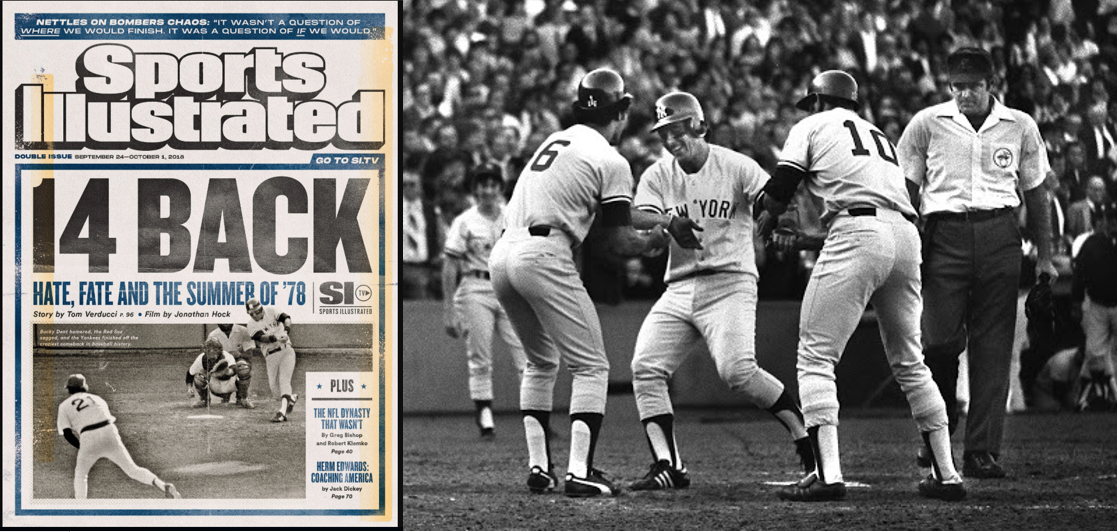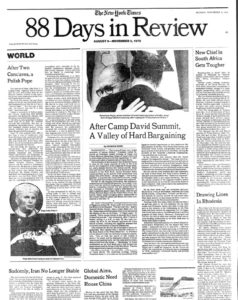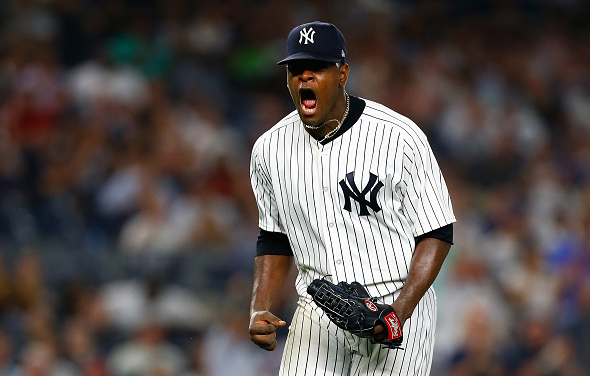Somehow 1978 was more chaotic for the Yankees than the year prior. 1977 was just a preamble. It was dominated by the love-hate triangle of Billy Martin, Reggie Jackson, and George Steinbrenner. Billy played the role of the hot-headed manager. Reggie was the expensive and cocky superstar. George was the boisterous owner. Everything they did and every word that came out of their mouth only added fuel to the fire, but somehow while the Bronx was burning, the Yankees won a championship.
Entering ‘78, expectations were even higher. The assumption was that the Reggie vs. Billy show was over and George would back-off, seeing as how the team achieved what he always demanded. But, as you know, that’s not what happened.
By the middle of July 1978 the Yankees needed a telescope to see the Red Sox atop the division. The owner, unhappy with the team’s performance, felt he needed to meddle in every on-field decision. The manager was in a downward spiral that only led one place: out the door. Newspaper headlines focused more on the clubhouse chaos than the actual baseball being played, which was best described as underachieving. Nobody could have predicted the Yankees would chase down the Red Sox and the two teams would play one of the most anticipated and memorable baseball games in history. But how were the Yankees able to turn things around so dramatically?
Podcast – A Brief History: Game 163, the Yankees & Red Sox in 1978
Listen to the fully history podcast below! I go inside Game 163 to explore all the craziness that happened throughout the 1978 Yankees season with Billy Martin, Reggie Jackson, George Steinbrenner, the Red Sox, the media and more.
The Bronx Zoo
That season, once again, Reggie was involved in all the madness. Everything bubbled to the surface on July 17. The Yankees were just beginning to turn their season around and were facing the Royals, the team they’d end up facing three straight years in the ALCS. Martin gave Reggie the bunt signal in the 10th inning to advance Munson to second. The Yankees needed a win so badly that Billy was willing to have his most powerful hitter bunt. After a failed first attempt, Billy changed his mind and gave Reggie the swing-away sign, but Reggie continued to try and bunt and eventually popped-up his final attempt. There can be no second-guessing what Reggie was doing, because third-base coach Dick Howser even went to Reggie to verbally tell him the bunt was off. Reggie simply ignored his manager.
This sent Billy off the deep end. He was so upset about potentially losing his clubhouse (among many other things) that he effectively sabotaged his own job.
It was all par for the course in 1978. By then the Yankees had become legendary for all the wrong reasons. The press had never-ending material with Billy, Reggie and George, but the rest of the guys had their own tabloid names as well: Thurm, Sparky, Bucky, Lou, Goose, Gator, Figgy, Mick the Quick, Cat and Puff all provided stories. As one media member who followed the team put it:
Any Yankee could be a story any time of any day.
Here are some of the highlights from the season (eh, maybe they’re lowlights):
February | Thurman Munson, the team’s captain, showed up late for spring training and asked to be traded to the Indians so he could be closer to his home. He also declared he would not be speaking to the media that season.
February | The 1977 Cy Young winner, Sparky Lyle, also showed up late to camp because he was upset that Steinbrenner signed Goose Gossage and made him the closer. When Lyle finally arrived, George had hired a marching band to greet him with a rendition of “Pomp and Circumstance,” which was Lyle’s entrance music. Lyle didn’t appreciate the gesture and asked to be traded.
March 17 | George gathered reporters to rip the team for losing the St. Patrick’s Day game. A SPRING TRAINING GAME!
April | Lyle, Munson, Rivers, White and Graig Nettles — five established Yankees at that point — all skipped the team’s Welcome Home Dinner to send a message to Steinbrenner. The message? We’re not your puppets.
May | With Munson still refusing to talk to writers, a New York Times reporter criticized the captain for being “grumpy, grouchy, ornery, irascible and sometimes surly” and that it was all a facade to make him seem tougher than he really was.
May 14 | After blowing a 3-run lead in Kansas City, players and coaches got into a drunken argument on a commercial flight to Chicago (yes, commercial flight with regular passengers on it). Munson was blaring music from a boombox, Rivers was throwing cards at passengers, Billy called out Munson for not acting like a captain, Dick Howser almost fought Rivers and Elston Howard had to step into the middle of it all to calm people down. As if that weren’t enough, when they got to the hotel they made the bar their first destination and Billy and Munson got into an argument. The team was falling apart at the seams.
June | The Yankees deficit in the division started to grow and the team started to play worse. Columnist Dick Young began his daily hammering of Billy, essentially calling for his job. The articles especially got to Martin because Steinbrenner and Young were close.
By this time it wasn’t just New York newspapers covering the Yankees. Writers from around the league followed the Yankees like they were a traveling rock band — a dysfunctional rock band.
June 18 | The Yankees lost 3-2 to the Angels on a 9th inning homer by Ron Fairly. Prior to the at bat, Martin sent pitching coach Art Fowler to the mound to tell Figueroa to pitch around Fairly. Figgy proceeded to pitch to Fairly, giving up the game-deciding homer. After the loss, Billy told reporters that he told Figueroa to pitch around him but the pitcher disobeyed orders. Figgy says he never received those instructions — either way, it was a terrible look and perhaps a sign that Martin was losing his clubhouse.
June 19-25 | A few days later in Boston, Billy got into a screaming match with reporters in the clubhouse, accusing them of trying to run him out of town. Later on that same road trip it became clear that no matter if the Yankees won or lost, the headline the next day would be about Billy Martin’s antics.
June 26 | With the Yankees 9.5 games back, George assured the press that Billy would remain manager for the rest of the season. Whoops.
After the All-Star break, things didn’t get any better. As I said, it culminated with the Reggie bunting incident on July 17. After his team suspension, Reggie had some work to do in the clubhouse because he lost the respect of some teammates for disobeying the manager and possibly costing the Yankees a game they desperately needed.
On their next road trip, Billy’s drinking was getting out of hand. He didn’t show up to a game in Minnesota until about an hour before first pitch. Then he made the comments in Chicago that sealed his fate, in reference to Reggie and George:
One’s a born liar. The other’s convicted.
Billy resigned the next day. If he hadn’t he would have been fired. The Post’s headline pretty much summed it up: GOODBYE AND GOOD RIDDANCE.
A week after his resignation, Billy returned at Old Timers’ Day in one of the more ridiculous George stunts of all time, announcing that Billy would be the manager again in 1980. In the meantime, Bob Lemon was hired as manager. Lemon was a Hall of Fame pitcher for the Indians and the pitching coach for the Yanks under Martin in ‘76. He then went to manage the White Sox in ‘77-78, but was fired mid-season. Steinbrenner quickly brought him back and he stepped in for Billy after he resigned.
Lemon was the polar opposite of Billy. He brought a calmness to the chaos. But perhaps the most underrated break the Yankees got that season was the newspaper strike in early August.
Media Craze
Eleven days after his Old Timer’s Day return, Billy agreed to a luncheon with all the prominent baseball writers in the New York area — and there were a lot of them. Reporters from the New York Times, the New York Post, the Newark Star-Ledger, and Newsday attended this roundtable. It was all coordinated behind Steinbrenner’s back.
As Billy loosened up (read: got drunk) he began to let the quotes fly. By then he had made up with George but still hated Reggie, saying he meant what he said and that he never considered Reggie the “superstar” the media portrays him as. Martin told reporters he never put Reggie over guys like Chambiss, Munson, Randolph or Rivers. He added, “There were times I put Chicken Stanley ahead of him.” Fred “Chicken” Stanley was a career .216 hitter and backup infielder. It was a preposterous comment.
The media had what they wanted — another controversial headline from the mouth of Billy Martin. They also knew George would be furious because it would create more drama for his team that had seemingly, finally, gotten past all the drama.
When George heard about the luncheon he was indeed furious. But lucky for him and the Yankees, it was August 9th, the night the newspapers went on strike. There would be no papers printed for the next day, and as the strike lingered on, the Yankees flew under-the-radar.
Smaller papers covered the team and a few upstart ones tried to make a name for themselves, but the major ones — the Times, the Post, Newsday — were not there to amplify the Yankees’ chaos to the masses. The team went 37-14 after the paper strike and Lemon later said:
The strike, coming when it did, did more for us than if we picked up a 20-game winner.
Obviously a lot had to happen for the Yankees to catch Boston. There was the Billy-to-Lemon transition. There was “The Boston Massacre” 4-game sweep in early September. There was Ron Guidry’s clutch performances. There was Bucky F–ing Dent! There was Reggie and Goose and Thurm. But there was also the newspaper strike, which allowed the Yankees to breathe.
From 14-down on July 19 to up-1 on October 2, it was the craziest ride any team has ever gone on.





